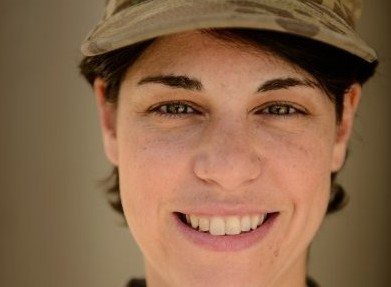By Drew Brooks
The Fayetteville Observer, N.C.
BAGRAM AIRFIELD, Afghanistan
Army Capt. Heather Borshof expects the questions.
“What’s that on your uniform?” passers-by ask the chaplain for the Fort Bragg-based 330th Movement Control Battalion. It’s the Ten Commandments topped with a Star of David, the symbol for Jewish chaplains.
“Women can be rabbis?” they ask. Yes, they have served in that role for decades.
Borshof, who deployed with her battalion — part of the 82nd Sustainment Brigade — in November, said she is used to the queries.
A female chaplain is a rare sight in the military. A female Jewish chaplain? There is only one other in the active-duty Army, she said. And Borshof was the first in a generation. She follows in the footsteps of Chana Timoner, who served at Fort Bragg in 1993 and died in 1998 from complications with a virus.
This week, Borshof has hosted two Passover seders at Bagram Airfield, where she is the only rabbi to be stationed long-term. But she said her chief role is to counsel soldiers, no matter their religion.
“I travel for our soldiers,” she said, referring to the battalion’s 19 movement control teams spread across Afghanistan. “I actually don’t travel for the religious community.”
Borshof’s path to her chaplaincy was not always clear-cut.
A devout child in Manalapan, N.J., Borshof said her parents were nonetheless surprised when she told them her intentions after a trip to Israel.
She was studying to become a rabbi as part of her first year at Hebrew Union College-Jewish Institute of Religion. Borshof said she was impressed by the population, which is required to serve in the military.
That inspired her to serve in her own way.
“Not too many of my colleagues do this,” she said.
After participating in a program that allowed her to work with chaplains while in school, Borshof said, she decided to commit to active duty.
She began her career at Fort Belvoir, Va., and moved to Fort Bragg shortly before her unit deployed.
“It’s like a different Army,” she said of her two duty stations.
The deployment is not always easy. Borshof said it is difficult traveling so often, and her parents worry about her safety.
When she arrived in Afghanistan, Borshof was the only Jewish chaplain here. Two more have since joined her. One is in Kabul, and the other is here for Passover only. Borshof is still called on for special services, such as a Holocaust remembrance ceremony scheduled for later this month.
“It’s draining. It’s long hours, and it’s really no days off,” she said. But there are no regrets.
“I wouldn’t trade it,” said Borshof. “I just feel very fortunate to have the opportunity to work with all the people I do.”














































































































































































































































































































































































